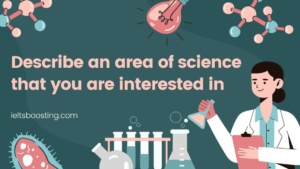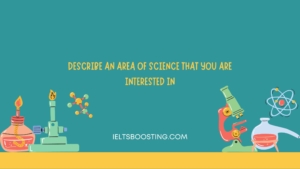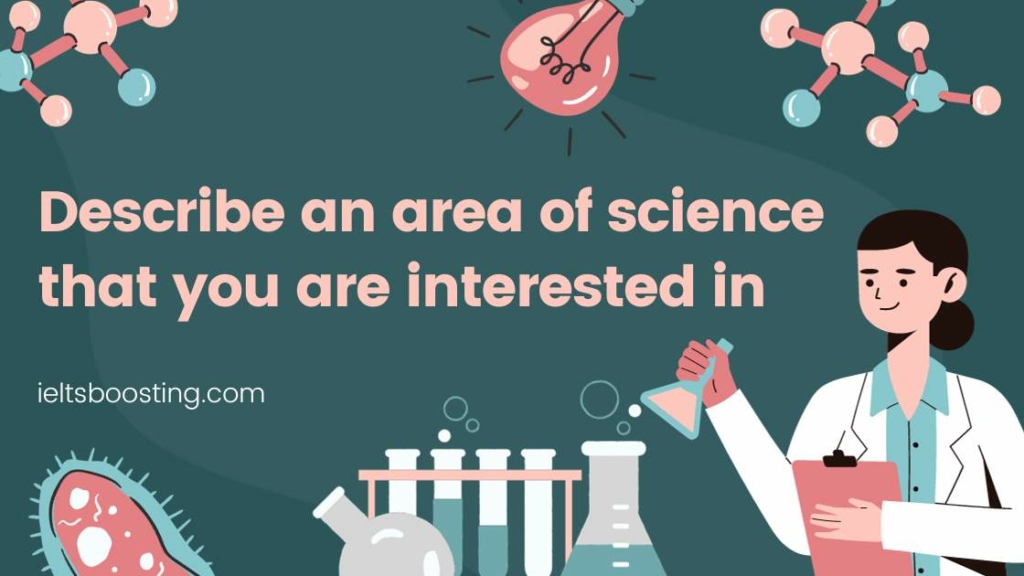Describe an area of science that you are interested in
You should say to describe an area of science that you are interested in
Which area it is
When and where you came to know this area
How you get information about this area
And explain why you are interested in this area

describe an area of science that you are interested in
Sample answer to describe an area of science that you are interested in
The area of science that has recently piqued my interest is environmental science. This fascination began a few weeks ago when I saw a striking advertisement billboard about environmental problems at a busy intersection.
To gain a deeper understanding in this field, I’ve been actively seeking information through various channels, such as BBC Earth on Facebook and YouTube. Additionally, I have spent time reading research papers and watching documentaries.
There are two main reasons behind this motivation. Firstly, I want to understand the complex environmental problems our world is facing, particularly in my home country, Vietnam. I am deeply concerned about issues like pollution, deforestation, and climate change, which are not only global concerns but also have a significant impact on Vietnam. Moreover, I am motivated by a personal commitment to contribute, even in a small way, to addressing these environmental challenges. Understanding the science behind these issues is the first step in making informed decisions and taking action, whether it be through community projects, personal lifestyle changes, or supporting relevant policies and initiatives.
Explore more: ielts speaking part 2

describe an area of science that you are interested in
Part 3-describe an area of science that you are interested in
Why do some children not like learning science at school?
- Challenging (Vietnamese: Đầy thách thức) – Difficult and requiring effort.
- Grasp (Vietnamese: Nắm bắt) – To understand or comprehend something.
- Complex (Vietnamese: Phức tạp) – Complicated and consisting of interconnected parts.
- Engagement (Vietnamese: Sự tham gia) – Involvement or participation in an activity or subject.
- Abstract (Vietnamese: Trừu tượng) – Existing as an idea but not having a physical presence.
- Terminology (Vietnamese: Thuật ngữ) – Specialized vocabulary or language used in a particular field.
- Disinterested (Vietnamese: Không quan tâm) – Lacking interest or enthusiasm.
- Perceived (Vietnamese: Được nhận thức) – Understood or interpreted in a certain way.
Is it important to study science at school?
Studying science at school is undeniably important because it equips students with critical thinking skills, enhances their understanding of the natural world, and prepares them for various careers and informed decision-making. For example, when a student understands the principles of electricity by learning physics, they can initially apply this knowledge to address electrical problems in their homes such as fixing a faulty circuit or replacing a damaged electrical outlet. Subsequently, they can gain a better understanding of the principles behind many electrical devices they encounter
- Undeniably (không thể phủ nhận): In a way that is too certain to be disputed or denied; undoubtedly.
- Equips (trang bị): Provides with the necessary items for a particular purpose.
- Critical thinking skills (kỹ năng tư duy phản biện): The ability to think clearly and rationally, understanding the logical connection between ideas.
- Enhances (tăng cường): Intensifies, increases, or improves the quality, value, or extent of something.
- Natural world (thế giới tự nhiên): The aspects of the world not created or altered by humans, including animals, plants, and geographical features.
- Informed decision-making (quyết định có thông tin): Making choices based on full understanding and knowledge.
- Principles (nguyên tắc): Fundamental truths or propositions that serve as the foundation for a system of belief or behavior or for a chain of reasoning.
- Electricity (điện): A form of energy resulting from the existence of charged particles, such as electrons or protons.
- Physics (vật lý): The branch of science concerned with the nature and properties of matter and energy.
- Faulty circuit (mạch hỏng): An electrical circuit that is not working correctly due to a defect.
- Electrical outlet (ổ cắm điện): A point in the wiring system at which current is taken to supply utilization equipment.
- Electrical devices (thiết bị điện): Machines or pieces of equipment that operate using electricity.
- Encounter (gặp gỡ): Unexpectedly experience or be faced with something.
Which science subject is the most important for children to learn?
Biology is arguably the most important science subject for children to learn. It provides fundamental knowledge about the human body and the ecosystem, helping children understand the interdependence between humans and nature. For instance, by studying biology, students can learn about human anatomy, giving them insight into how their bodies work and the importance of maintaining good health.
- Biology (sinh học): The scientific study of living organisms and their interactions with the environment.
- Fundamental (cơ bản): Forming a necessary base or core; of central importance.
- Ecosystem (hệ sinh thái): A biological community of interacting organisms and their physical environment.
- Interdependence (sự phụ thuộc lẫn nhau): The mutual reliance between two or more groups, species, or systems.
- Human anatomy (giải phẫu học con người): The scientific study of the structure of the human body.
- Insight (sự hiểu biết sâu sắc): The capacity to gain an accurate and deep understanding of someone or something.
- Maintaining (duy trì): Causing or enabling a condition or state of affairs to continue.
- Good health (sức khỏe tốt): The state of physical and mental well-being.
Should people continue to study science after graduating from school?
Yes, people should continue to study science after graduating from school. Continuing science education fosters a deeper understanding of the world, encouraging critical thinking and problem-solving skills. For example, renewable energy has been a hot topic in recent years; if an individual learns and gains a basic understanding of this field, they can better understand which types of energy are beneficial for human beings.
- Fosters (nuôi dưỡng): Encourages the development or growth of something positive.
- Deeper understanding (hiểu biết sâu sắc hơn): A more profound or comprehensive grasp of a subject or topic.
- Critical thinking (tư duy phản biện): The ability to think clearly and rationally, understanding the logical connection between ideas.
- Problem-solving skills (kỹ năng giải quyết vấn đề): The ability to find solutions to difficult or complex issues.
- Renewable energy (năng lượng tái tạo): Energy from a source that is not depleted when used, such as wind or solar power.
- Hot topic (chủ đề nóng): A subject that attracts a lot of public interest and discussion.
- Basic understanding (hiểu biết cơ bản): Fundamental knowledge or comprehension of a subject.
- Beneficial (có lợi): Resulting in good; favorable or advantageous.
How do you get to know about scientific news?
One effective way to stay updated with scientific news is through digital platforms. Online resources like scientific journals, news websites, and social media channels offer easy and quick access to the latest research and discoveries. For instance, following renowned science chanel like Discovery or subscribing to their newsletters can provide regular updates on groundbreaking scientific advancements.
- Updated (cập nhật): Brought up to date; made current or fresh.
- Digital platforms (nền tảng số): Online or electronic services and environments where users can access content, services, or applications.
- Online resources (nguồn lực trực tuyến): Information or services available on the internet.
- Scientific journals (tạp chí khoa học): Periodicals that publish research papers in various scientific disciplines.
- News websites (trang web tin tức): Online platforms that provide news and information on current events and topics.
- Social media channels (kênh truyền thông xã hội): Online platforms that allow users to create and share content or to participate in social networking.
- Renowned (nổi tiếng): Known or talked about by many people; famous, especially in a particular field.
- Subscribing (đăng ký): Arranging to receive something, typically a publication, regularly by paying in advance.
- Newsletters (bản tin): A bulletin issued periodically to the members of a society, business, or organization.
- Groundbreaking (đột phá): Innovative; pioneering, especially in being the first of a kind.
Should scientists explain the research process to the public?
It is essential for scientists to simplify their research methods to the general public. Clarifying the research process enhances public understanding and appreciation of scientific endeavors, fostering a more informed society. For example, when scientists shared the development process of COVID-19 vaccines, it increased public confidence and understanding, leading to higher vaccination rates.
- Essential (cần thiết): Absolutely necessary; extremely important.
- Simplify (đơn giản hóa): To make something easier to do or understand.
- General public (công chúng): Ordinary people in society, as opposed to experts or specialists.
- Clarifying (làm rõ): Making something less confusing and more clearly comprehensible.
- Research process (quy trình nghiên cứu): The systematic method of discovering new facts or testing new ideas or hypotheses.
- Enhances (tăng cường): Intensifies, increases, or further improves the quality, value, or extent of something.
- Appreciation (sự đánh giá cao): Recognition and enjoyment of the good qualities of someone or something.
- Scientific endeavors (nỗ lực khoa học): Efforts or attempts in the field of science.
- Informed society (xã hội được thông tin): A community of people who are well-informed and knowledgeable about important topics and issues.
- Development process (quá trình phát triển): The series of steps involved in creating and developing something, especially a product or idea.
- Public confidence (niềm tin của công chúng): Trust or belief of the general public in something or someone.
- Vaccination rates (tỷ lệ tiêm chủng): The percentage of people in a population who have received a particular vaccine.
Xem thêm: sách luyện thi ielts

